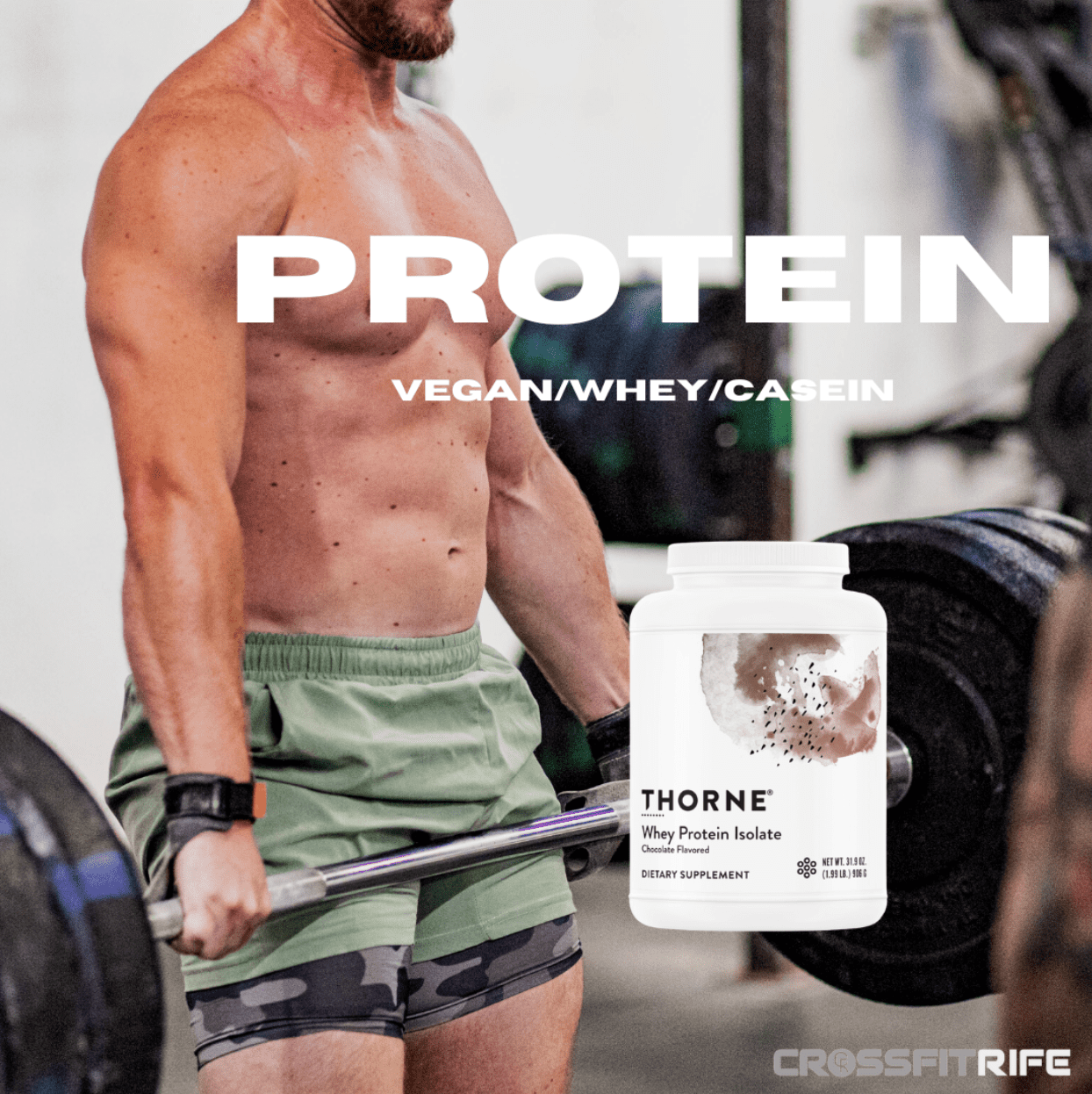As a CrossFit athlete, you know how important it is to fuel your body with the right nutrients to support your training and performance. Protein is an essential nutrient that plays a key role in
- Muscle building
- Recovery
- Overall health
If you’re looking to add more protein to your diet, one way to do so is by using protein powders and supplements. There are many different types of protein powders available, including casein, whey, and vegan proteins.
The Importance of Protein in Training
Proteins are made up of individual building blocks called amino acids. When we consume protein, the body breaks it down into its amino acids and uses them to build and repair tissues, including muscle. Some amino acids, called essential amino acids, cannot be produced by the body and must be obtained through diet. Adequate protein intake and the presence of all essential amino acids are important for building muscle mass. Without sufficient protein, the body will not have the necessary building blocks to repair and grow muscle tissue, leading to a decrease in muscle mass.
Different Types of Protein
Here’s a quick overview of the differences between these types of protein:
Casein protein: Casein is a slow-digesting protein that is found in milk. It forms a gel-like substance in the stomach, which can help to keep you feeling full and satisfied. Casein is often used as a nighttime protein, as it can help to slow down the release of amino acids and support muscle recovery while you sleep.
Whey protein: Whey is a fast-digesting protein that is also found in milk. It is a complete protein, meaning that it contains all nine essential amino acids. Whey protein is often used as a post-workout protein, as it can help to quickly repair and rebuild muscles after a workout.
Vegan proteins: Vegan proteins are plant-based proteins that are suitable for those following a vegan or plant-based diet. There are many different types of vegan proteins available, including pea, hemp, soy, and rice. Vegan proteins are often lower in certain amino acids compared to animal-based proteins, so it is important to ensure that you are getting a variety of different protein sources in your diet.
The Effects of Insufficient Protein Consumption
Insufficient protein intake can have several negative effects on those who train in a high-intensity workout program like CrossFit:
- Decreased muscle mass: Without adequate protein, the body won’t have the building blocks it needs to repair and build muscle tissue. This can lead to a decrease in muscle mass over time.
- Reduced muscle recovery and growth: Protein is essential for muscle recovery and growth after high-intensity workouts. Without enough protein, the body won’t be able to repair damaged muscle tissue and build new muscle as effectively.
- Impaired athletic performance: Muscle fatigue, decreased endurance, and slower recovery can all result from insufficient protein intake.
- Increased risk of injury: Lack of protein can weaken the immune system, making you more susceptible to injury.
- Decreased bone density: Protein is important for maintaining bone density and reducing the risk of osteoporosis. Insufficient protein intake can lead to a decline in bone density over time.
Overall, it is important to consume enough protein to support muscle growth and repair, especially when engaging in high-intensity activities like CrossFit.
How to Add More Protein
Here are some simple daily habits to increase protein intake:
- Eat protein-rich foods at each meal: Include foods like lean meats, poultry, fish, eggs, dairy products, beans, lentils, tofu, and nuts in your diet.
- Snack on protein-rich foods: Include high-protein snacks like Greek yogurt, nuts, seeds, cheese, or hard-boiled eggs in between meals.
- Use protein supplements: Whey protein powder, casein protein powder, and plant-based protein powders are convenient and easy ways to increase your protein intake.
- Add protein to meals: Mix protein powder into smoothies, oatmeal, or sauces to increase the protein content of your meals.
- Incorporate high-protein plant-based foods: In addition to animal proteins, foods like beans, lentils, and quinoa are excellent plant-based protein sources. There will be less bio-availability with regard to these foods, because not as much of the protein will be digestible but if you are trying to get incremental increases in your intake this can be a potential solution.
- Plan ahead: Pack high-protein snacks for on-the-go and prepare protein-rich meals in advance to ensure you have enough protein throughout the day.
Remember to spread your protein intake evenly throughout the day to support muscle recovery and growth, especially after high-intensity workouts.
By incorporating protein-rich foods into your meals and snacks, using protein powders and supplements, and getting creative with protein-rich recipes, you can easily add more protein to your diet and support your CrossFit training and performance. When choosing a protein powder or supplement, it is important to consider your dietary preferences and needs. You may want to try out a few different types of protein to see which one works best for you. Remember to always listen to your body and consult with a healthcare professional or a registered dietitian if you have any questions or concerns about your nutrition.






